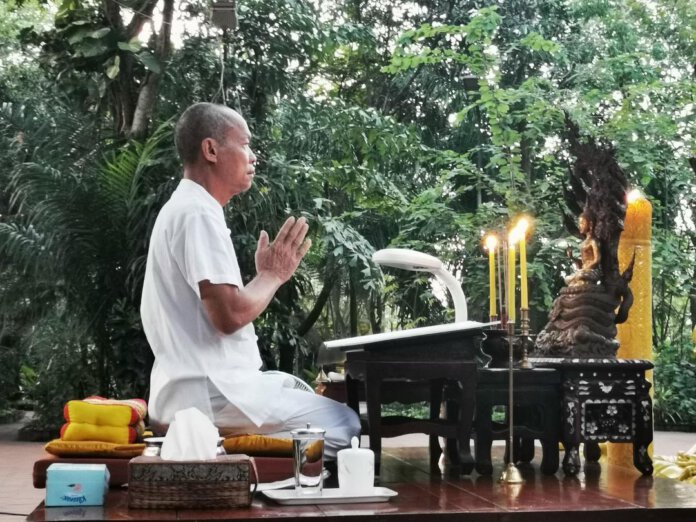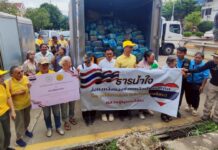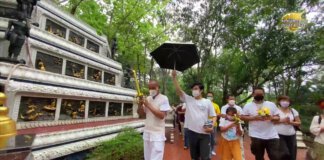มีลาภ เสื่อมลาภ
มียศ เสื่อมยศ
มีสุข เสื่อมสุข
มีทุกข์ เสื่อมทุกข์
มีนินทา ก็มีสรรเสริญ
มนุษย์เอ๋ย อย่าเห็นกงจักรเป็นดอกบัว
พักนี้เห็นบรรดานักวิชาการด้านศาสนา ตบเท้าเสนอหน้าพากันออกมาร่อนจดหมายให้คำแนะนำมหาเถรสมาคม ทำนองว่าชี้ทางสว่างให้ แต่สุดท้ายก็เพื่อปกป้องกลุ่มอลัชชีผู้ทุจริตเงินอุดหนุนวัดทั่วประเทศ
ด้วยการพยายามยกเอาหลักพระธรรมวินัยขึ้นมาอ้างในประเด็นที่อลัชชีได้ประโยชน์ ว่าต้องสำคัญกว่ากฎหมายบ้านเมือง เพราะเป็นวินัยกรรมของพระพุทธเจ้าที่ทรงมอบให้หมู่สงฆ์ได้ทำการปฏิบัติกันมาช้านานกว่ากฎหมายบ้านเมือง
ข้อนี้ฉันเห็นด้วย กับพวกนักวิชาการเหล่านั้น
หากหมู่สงฆ์พากันปฏิบัติตามหลักของพระธรรมวินัยอย่างจริงจัง เคร่งครัด กฎหมายใดๆ ก็มิอาจขยายอิทธิพลเข้ามาครอบงำคณะสงฆ์ได้
อีกทั้งหมู่สงฆ์องค์เณร จะได้รู้จักสะดุ้งผวา รังเกียจต่อความชั่วผิดบาป พากันสอดส่องชีวิตความเป็นอยู่ ข้อวัตรปฏิบัติของกันและกันด้วยความหวังดี เอ็นดู โดยใช้หลักการระงับอธิกรณ์ คือ เรื่องราวทั้งเล็กทั้งใหญ่ ที่เกิดขึ้นในสังฆมณฑลอย่างทันท่วงที ด้วยวิธีระงับอธิกรณ์ที่องค์พระบรมศาสดาทรงวางเอาไว้ให้ ๗ อย่างคือ
๑. สัมมุขาวินัย ตัดสินในที่พร้อมหน้าทั้ง โจทย์และจำเลยพร้อมพยาน ตามพยานหลักฐาน
๒. สติวินัย ถือสติเป็นหลัก การยกเลิกความผิดเพราะเป็นพระอรหันต์หรืออริยบุคคลที่จะไม่ทำผิดวินัยในข้อนั้นได้
๓. อมูฬหวินัย ผู้หายจากเป็นบ้า การเลิกความผิดเพราะผู้กระทำผิดนั้นวิกลจริตหรือเป็นบ้า
๔. ปฏิญญาตกรณะ ทำตามที่รับ การตัดสินตามการยอมรับผิด คำสารภาพของผู้กระทำผิด
๕. ตัสสปาปิยสิกา ลงโทษแก่ผู้ผิดที่ไม่รับ การลงโทษพยานผู้ที่ไม่ยอมพูดในการสอบสวนของคณะสงฆ์
๖. เยภุยยสิกา การตัดสินตามมติเสียงข้างมาก
๗. ติณวัตถารกะ ดุจกลบไว้ด้วยหญ้า วิธีประณีประนอม การตัดสินยกฟ้อง เลิกแล้วต่อกัน(ในกรณีทะเลาะกัน)
ที่ผ่านมาหากหมู่สงฆ์กระทำตามพุทธบัญญัติ เช่นนี้ มีหรืออาญาบ้านเมืองจะเข้ามาแทรกแซงพระธรรมวินัยได้
แต่ที่ผ่านมา ไม่ว่าจะเป็นคดีสมีพุทโธ สมีนิกร สมียันตระ สมีเณรคำ หรือแม้แต่การครอบครองรถหรู หนีภาษีของมหาเถร คดีบิดเบือนพระธรรมวินัยของธรรมกาย และคดีต้องอาบัติปาราชิกของธัมมชโย หรือคดีทุจริตเงินอุดหนุนวัดทั่วประเทศ ที่กรรมการมหาเถรเข้าไปมีส่วนพัวพัน
เรื่องดังกล่าวเหล่านี้ ล้วนเกิดขึ้นจากความอ่อนแอ อ่อนด้อยของหมู่สงฆ์ทั้งสิ้น เพราะหมู่สงฆ์ผู้ปกครองไม่เคยแสดงบทบาท ที่จะรังเกียจความชั่ว ผิด บาป โดยการรีบเร่งตั้งเรื่องอธิกรณ์และแสดงวิธีระงับอธิกรณ์ดังกล่าว ให้เป็นที่ประจักษ์ต่อสังคมพุทธเลย
เช่นนี้จะไม่ให้อาญาทางโลกเข้ามาแทรกแซงพระธรรมวินัยได้อย่างไร
และเมื่อผู้เดือดร้อนเสียหาย เขาพึ่งศาลสงฆ์ไม่ได้ เขาจึงต้องหันไปพึ่งศาลทางโลก
แต่เมื่อศาลทางโลกตัดสินลงทัณฑ์ตามพฤติกรรมการกระทำผิดของภิกษุนั้นๆ หมู่สงฆ์บางพวกกลับไม่ยอมรับ อ้างพระธรรมวินัย อ้างอำนาจพระสงฆ์
พอผู้เสียหายเข้าไปร้องเรียน กลับทำแบ๊ะ แบ๊ะ เป็นใบ้กันเป็นแถวๆ
ท่านต้องไม่ลืมว่า พระสงฆ์อยู่ใต้อำนาจพระธรรมวินัยแล้ว ยังต้องอยู่ภายใต้อำนาจรัฐธรรมนูญปกครองราชอาณาจักรไทย ทั้งยังต้องอยู่ภายใต้กฎหมาย และพระราชบัญญัติคณะสงฆ์
หมู่สงฆ์ทุกนิกายในพระพุทธศาสนา ยังต้องอาศัยอยู่ภายในร่มพระบารมีขององค์พระบาทสมเด็จพระเจ้าอยู่หัว ผู้ทรงเป็นเอกอัครศาสนูปถัมภก
อย่าถือตัวว่าเป็นนักการศาสนาแล้ว จะอยู่เหนือกฎหมาย
ประเทศนี้ไม่ใช่สำนักวาติกันนะจ๊ะ
พุทธะอิสระ
๒๐ เมษายน ๒๕๖๔
————————————————–
Everything is this world is impermanent.
April 20, 2021
There is gain of fortune. Then, there is loss of fortune.
There is gain of rank. Then, there is loss of rank.
There is happiness. Then, there is less happiness.
There is suffering. Then, there is less suffering.
There are gossips and there are praises.
Human, do not mistake blades for a lotus.
Lately, religious academicians have submitted their recommendation letters to the Sangha Supreme Council, like they were providing solutions, but at the end they did that to protect a group of shameless monks who embezzled funds of nationwide temples.
They have tried to raise that the code of monastic rules to be more important than laws, and also cited that the Lord Buddha gave monastic rules for Buddhist clergy to follow for much longer time than country laws.
I agree with this point.
If Buddhist clergy had strictly followed the code of monastic rules, any laws would not have influenced on the clergy.
And if the clergy had been afraid of evils and sins, as well as kept looking at their conducts and among themselves with good intention and kindness. And if they had applied the following seven principles given by the Lord Buddha to promptly settle disputes, whether small or big, which have happened in the monastic order.
1. Making judgment in front of plaintiffs, defendants, witnesses, according to witnesses and evidences
2. Having consciousness as major principle. Dismissal of accusation because of being Arhats or other types of noble individuals who cannot violate such rule.
3. Those who have regained their sanity. Dismissal of wrongdoing because the wrongdoers were insane or crazy.
4. Judgement according to confession of wrongdoers
5. Punishment for wrongdoers and witnesses who did not tell the truth during investigation.
6. Judgment according majority votes
7. Like being covered with grass, compromise, and dismissal of charges, and cease of conflict (in case of quarrel)
In the past, if the clergy had followed the Lord Buddha’s rules, would laws have ever interfered with the code of monastic laws?
In the past, whether the cases of Bhavana Bhudtho, Nikorn, Yantra, Nenkham, or a member of the Sangha Supreme Council’s possession of luxury cars of which taxes have been evaded, the Dhammakaya’s distortion of code of monastic rules, Dhammachayo’s gravest transgression of monastic rules, or corruption of nationwide temple funds in which some members of the Sangha Supreme Council were involved. These cases occurred because of weakness within the clergy. The clergy have never shown their disgust against evils and sins by quickly settling disputes to make it clear among the Buddhist society.
As such, it is not surprising why worldly laws have interfered the code of monastic rules.
When there are victims, they cannot depend on monastic court. So, they have turned to worldly courts instead.
But when worldly courts have sentenced according to behaviors of such monks, some groups of monks do not accept and claim on the code of monastic rule and monastic power.
When victims reported them complaints, they turned dumb.
Please don’t forget that monks are not only subject to the code of monastic rules, but also the Constitution of the Kingdom of Thailand, laws, and the Sangha Act.
Monks of all Buddhist doctrines are under patronage of His Majesty the King who is upholder of religions.
Don’t think that being religious academicians is above laws.
This country is not Vatican.
Buddha Isara







